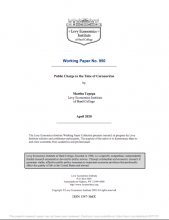Public Charge in the Time of Coronavirus
Author Martha Tepepa lays out a critique of how the public sector, specifically the federal government, has responded to the needs of undocumented people in the COVID-19 pandemic. She argues that the reliance on private sector markets in the American “means-tested assistance model” has major drawbacks. In delegating responsibility for pandemic assistance to the private sector, the federal government deprives society, particularly vulnerable groups, of an egalitarian distribution of resources. Additionally, some Americans are prone to characterizing public assistance recipients as failures, lazy, and unworthy of aid. Tepepa suggests that the February 2020 final ruling on the Inadmissibility on Public Charge Grounds exacerbates these social stigmas. In addition to disqualifying undocumented migrants from immigration relief, the Public Charge ruling worsens the public health crisis. The consequence of being labeled as inadmissible discourages migrants from seeking financial and medical assistance. Along with the xenophobic ways the health sector disadvantages migrants, Tepepa suggests that a large, untreated population could worsen COVID-19’s spread. Referencing historical precedence, Tepepa finds that society would most benefit if the public sector took on a larger role in facilitating public aid. (Monica Leon for The Immigrant Learning Center’s Public Education Institute)
Tepepa, M. (2020, April 8). Public Charge in the Time of Coronavirus (Working Papers Series No. 950). Levy Economics Institute of Bard College. https://papers.ssrn.com/sol3/papers.cfm?abstract_id=3571721

